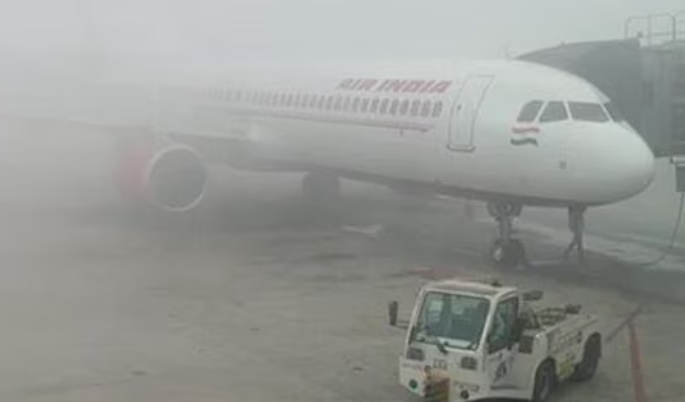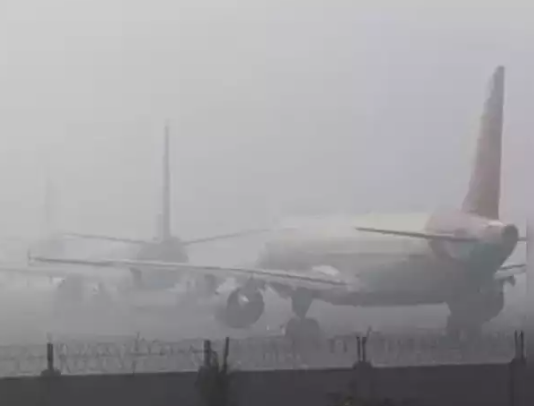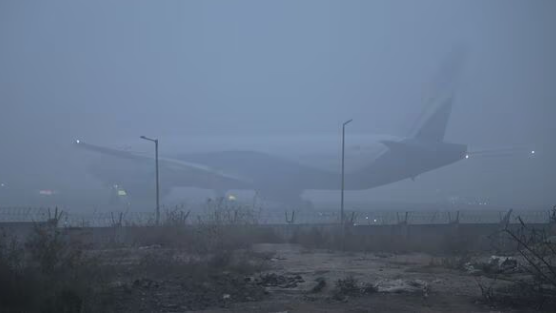
Delhi Weather, Causing 30 Flight Delays and Disrupting Train Services in Frigid North India
Delhi, Leaving Passengers Stranded, Flights Delayed, and Trains Running Late
In yet another bout of challenging weather, Delhi residents awoke on Tuesday to a city cloaked in dense fog and bone-chilling cold, disrupting the normal flow of life. The adverse conditions hit both flight and rail operations, causing widespread delays and cancellations, and leaving thousands of passengers stranded at airports and railway stations.

The India Meteorological Department (IMD) reported that Palam and Safdarjung Airports in Delhi recorded visibilities within 500 meters in the morning. Delhi’s Indira Gandhi International Airport (IGIA) experienced the brunt of the weather, with around 30 flights delayed and 17 canceled due to low visibility amid the dense fog, as reported by news agency ANI, citing airport officials.
The weather agency highlighted the prevalence of fog patches over northern and northeastern states, leading to low visibility in airports across these regions. In a post on X, the IMD stated, “Layer of fog is seen from Punjab to northeast India across Haryana, North MP, UP, Bihar and West Bengal at 0530 hrs IST. The patches of fog are also seen along the east coast of India as shown in the attached Satellite Imagery.”
Providing specific visibility data, the IMD added, “Airports visibility data shows the following visibilities in dense to very dense fog conditions: Varanasi 00m; Agra 00m; Gwalior 00m; Jammu 00m; Pathankot 00m; Chandigarh 00m; Gaya 20m; Prayagraj 50m; Tejpur 50m; Agartala 100m; Vijaywada 100m; Bagdogra 100m.”

Passengers at the affected airports faced significant challenges due to long delays and flight cancellations. One passenger shared his experience at IGI airport, stating, “My flight was about to depart at 8:40 am but it is now scheduled to depart at 10:30 am…The reason they have given is mainly due to weather & fog.”
Monday witnessed adverse weather conditions, with five flights diverted and over 100 flights delayed at the Delhi airport. The impact extended to the railways, with approximately 30 trains, including the Rani Kamalapati-Hazrat Nizamuddin Vande Bharat and Howrah-Delhi Rajdhani Express, running behind schedule due to the dense fog and cold wave engulfing the national capital.
The minimum temperature recorded on Tuesday was 5 degrees Celsius, following a season’s low of 3.3°C on Monday. The prevailing cold waves and fog are expected to persist over the next few days, prompting the IMD to issue an orange alert for Delhi on Tuesday and Wednesday. The capital city registered a maximum temperature of 19.7°C on Monday.
Kuldeep Srivastava, a scientist at IMD, indicated that no significant change in the weather is anticipated over the next 48 hours, with the minimum temperature likely to hover in a similar range. He stated, “An orange alert has been issued for cold wave conditions to continue. We will also continue to see dense to very dense fog in the early hours, which can impact flights, trains, and road travel.”

Simultaneously, the air quality in the national capital deteriorated to the “severe” category on Tuesday, with the Air Quality Index (AQI) reaching 401 in the Anand Vihar area, according to the Central Pollution Control Board (CPCB). Responding to escalating pollution levels, the Commission for Air Quality Management (CAQM) invoked Stage 3 measures under the Graded Response Action Plan (GRAP) on Sunday.
Monday witnessed a significant decline in visibility, with ‘zero’ recorded for the first time this winter season in various regions, including Sri Ganganagar in Rajasthan, Patiala, Ambala, Chandigarh, Palam, Safdarjung (New Delhi), Bareilly, Lucknow, Bahraich, Varanasi, Prayagraj, and Tezpur, as reported by the weather department.
As the challenging weather conditions persist, the disruptions in Delhi extend beyond immediate inconveniences. The dense fog not only impacts travel but also brings attention to the broader issues of environmental conditions, transportation infrastructure, and public preparedness.
The recurring nature of such fog-induced disruptions raises questions about the city’s resilience and preparedness for adverse weather events. Airports and railway stations play critical roles in ensuring the smooth functioning of transportation systems, and events like flight delays and cancellations, as well as train delays, underscore the need for robust contingency plans and improved infrastructure.
The experiences shared by passengers, detailing hours of waiting and uncertainty at the airports, highlight the human impact of these disruptions. As individuals face the challenges of delayed travel plans, there is an increasing demand for transparency from authorities and effective communication to manage passenger expectations during such weather-related crises.
Beyond the immediate concerns, the plummeting air quality adds another layer of complexity to the situation. With the Air Quality Index (AQI) reaching ‘severe’ levels, the health implications become a cause for worry. Delhi has been grappling with air pollution concerns, and incidents like these underscore the urgency of addressing the environmental factors contributing to the deteriorating air quality.
The invocation of Stage 3 measures under the Graded Response Action Plan (GRAP) signals the recognition of the severity of the pollution issue. It prompts a reevaluation of existing policies and an exploration of more sustainable solutions to mitigate the long-term impact of air pollution on public health and the environment.
For the latest updates-click here.


